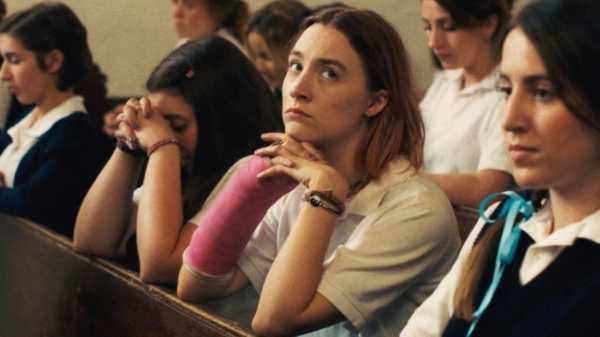
The lengthy span of Oscars campaigning—from the time that a movie
secures its festival-première slot to the banqueting and junketing, from
the slog of previous awards bestowed by critics’ groups and craft guilds
to the media-chatter circuit (such as this very post), and through the
near-constant surveillance that candidates seem to be under as they
smile for every camera and speak into every microphone—resembles, above
all, a political campaign. The length of the process appears calculated
to insure that the Academy gets to consider candidates in great and
thoughtful detail, so that dubious or tainted ones come to light and are
eliminated from consideration early enough to spare the organization,
and the industry, the detrimental effects of their victory, exactly as
is done with in the extraordinarily protracted campaigns for President
of the United States. (How’d that work out for you, America?)
Yet it’s worth recalling that the Oscars were conceived, ninety-one
years ago, as a public-relations stunt intended to distract public view
from the scandals engulfing Hollywood and the hostility that many of the
industry’s supposedly immoral movies aroused. The Oscars were devised as
Hollywood’s attempt to spotlight the movies and the artistry that, its
potentates think, represent its virtues, its good intentions and worthy
achievements. It also functions as an unending advertisement for
Hollywood and its tributaries, an advertising campaign that’s actually
produced not by the Academy but by the media, whose reporting on all
things Oscar (as in this very post) does a better job of pushing popular
movies into the public consciousness—and pushing other, less-popular
movies further into the background—than could any concerted top-down
effort from the Academy or its ad agency.
This year, the tail-swallowing calendar of all awards, all the time is
enlivened by a happy event, the release of Ryan Coogler’s “Black
Panther,” which (it will be no surprise to anyone to hear) is, I think,
already a shoo-in for a batch of nominations next year. (This happened
last year, too, with the release of “Get Out” on February 24th, two days
before the Oscars ceremony.) “Black Panther” will, I think, achieve next
year what many in the industry have long hoped would happen: namely, to
promote some of the most popular studio tentpole films to Oscars
consideration. (In 2009, with this goal in
mind,
the Academy expanded the number of spots for Best Picture nominees from
five to a maximum of ten, but, until now, it hasn’t worked as
planned—rather, the expanded list has accommodated even more of each
year’s lower-budget, less-commercial films.)
As in political elections, the filtering of voters in the Oscars makes a
big difference; for instance, Coogler’s previous film, “Creed,” from
2015, is as drastic, original, and politically insightful a
reconfiguration of a familiar franchise as is “Black Panther,” but it
received only one Oscar nomination—for its most prominent white actor,
Sylvester Stallone, for Best Supporting Actor. In the wake of the
#OscarsSoWhite campaign, in 2015 and 2016, the Academy rightly took
long-overdue steps to include more widely representative—and
professionally active—members, and the results have been apparent and
salutary. Changes in the industry over all, regarding the kinds of
movies that get made, are slow—though they are happening, very
gradually.
This, of course, is the first awards ceremony to take place in the wake
of another vast cultural shift, issuing from the revelations of
widespread sexual harassment and sexualized violence in the movie
industry. Viewers and voters alike are paying attention to over-all
gender injustices and to the inequalities that those depredations (and
the extensive network of related cover-ups) both depend on and
perpetuate. Every Oscars season, every slate of nominees and list of
winners, is scarred by the absence of the people who haven’t worked, the
up-and-comers they haven’t mentored, the movies that didn’t get made—and
those movies that did get made, and celebrated, on the basis of dirty
dealings.

Further Reading
New Yorker writers on the 2018 Academy Awards.
There is, I hope, a historic change taking place in the realm of mores,
one that may have been sparked by news from Hollywood but should
generate changes throughout society more broadly. It should alter the
decisions regarding the movies that get made, who makes them, and the
way that they’re made; it should also, more trivially but quite
conspicuously, have an effect on the Oscars, and I think it will do so
this year—but not much. I suspect, perhaps invidiously, that much of the
change that has been taking place behind the scenes involves a sense of
misplaced and self-interested fear: people in the industry hoping that
their business partners, artistic collaborators, or friends, or they
themselves, aren’t among the predatory men whose victims summon the
courage to name them—and that many in the industry are just crossing
their fingers that this year’s winners won’t be tainted with any such
accusations.
A quick practicality: it’s worth mentioning that the Best Picture
category is chosen by an elaborate system of ranked voting that’s meant
to prevent a winner from squeaking by with a very small plurality of
votes. In the other categories, voters choose one of the five nominees;
in Best Picture, they cast preferential
ballots in which voters rank all nine nominees from first through last choice.
That’s why, in predicting winners, it isn’t only the predicting of
favorites but also of second- and third-favorites that matters. Yet,
because of the nature of the redistribution of votes, it’s thefurther-down preferences of voters whose first choices are least likely
to win that become most important. This is another way of saying that,
with another series of gears and chutes and springs and marbles tossed
into the system, I make my predictions on the basis of an
all-the-more-rationalized set of wild speculations.
Click to view Richard Brody's Oscar ballot, with his preferences in blue and predictions in red.
My Oscar Predictions
Best Picture
“The Shape of Water”
“The Shape of Water” is a romantic, political, and movie-centric fantasy
that blends a love-conquers-all tale with easy retrospective
sociopolitical righteousness and a paean to classic Hollywood. I think
that many of the more forward-thinking Academy members will prefer
either “Get Out” or “Lady Bird,” and that, as they split the vote, “The
Shape of Water” will win.
Best Director
Guillermo del Toro
If the likely Best Picture winner were the kind of movie that, like,
say, “Darkest Hour,” presents its virtues more plainly, the director of
a showier film would win; but since del Toro’s film is by far the
gaudiest of the nominees, he’ll win for Best Director, too.
Best Actress
Frances McDormand
I think it’s between Sally Hawkins and McDormand, and I think that the
righteous aggression of McDormand’s performance will prevail over the
steadfast courage of Hawkins’s. Also, I think that “Three Billboards”
will have suffered, entirely appropriately, from a wave of critical
discernment following its festival successes, regarding its oblivious
racism—but that McDormand’s performance won’t be tainted by it.
Best Actor
Gary Oldman
The Chalametians and the Kaluuyans will split the more forward-looking
votes, leaving the field open for the Oldmen.
Best Supporting Actor
Willem Dafoe
Willem Dafoe’s performance is vigorous and heartwarming; in the grim
situations of “The Florida Project,” he provides the magic word, hope.
Christopher Plummer’s performance in “All the Money in the World” is
superior, but it’s a reminder of an unpalatable irony, of the smiling
depredations of wealth; who needs another reminder?
Best Supporting Actress
Laurie Metcalf
Five excellent performances (although the way that del Toro directs
Octavia Spencer borders on caricature). Mary J. Blige’s is the most
distinctive; Lesley Manville’s, the most precise; Allison Janney’s, the
most showy (which is why I long thought she’d win); but without
Metcalf’s performance, “Lady Bird” nearly doesn’t exist; I think she’ll
win.
Adapted Screenplay
“Call Me by Your Name”
James Ivory’s adaptation of André Aciman’s novel shines with aphorisms
and sells it with the father’s big monologue near the end.
Original Screenplay
“Three Billboards Outside Ebbing, Missouri”
Academy voters will ignore the oblivious substance of the movie and
celebrate the sheer brazen quantity of its flashy text—in effect, an
award for technical achievement in writing.
Cinematography
“Blade Runner 2049”
The most accursed category, almost every year. The prevailing standards
reflect a petrified academicism that doesn’t respond to the last sixty
years of original cinematography. The best cinematography of the year is
seen in Sean Price Williams’s expressionistic agility in “Good Time,”
Andrew Droz Palermo’s luminous grace in “A Ghost Story,” and Paul Thomas
Anderson’s confectionary intimacy in “Phantom Thread.” Rachel Morrison’s
work in “Mudbound” displays much more observational curiosity than the
other four nominees.
Documentary Feature
“Faces Places”
A hard category. The film by Agnès Varda and JR is a political film,
too, but one of stealth and whimsy. It’s also the most inventive of the
films. Yance Ford’s “Strong Island,” a powerful first-person film, is
close. “Last Men in Aleppo” is unbearable to watch, in the most
admirable sense—it films atrocities, and courageous efforts to cope with
them, and sparks a sense of anger and frustration that’s nearly
unendurable.
Foreign-Language Film
“Loveless”
This is the second-most-accursed category, because of the system used
for nominations: official boards from each country offer one nominee,
and the Academy is constrained to choose from among them. You’d need a
microscope to find any differences between this year’s five films. The
substance of “The Insult” is more attuned to the Academy’s long-standing
predilections, but the technique and tone of “Loveless” will prevail.
Animated Feature
“Coco”
Don’t bet against Pixar.
Animated Short Film
“Lou”
Don’t bet against Pixar.
Documentary Short Subject
“Traffic Stop”
A very strong category this year; each of the films is, in effect, a
feature’s worth of movie condensed into a short.
Live-Action Short Film
“DeKalb Elementary”
It’s a drama about a school shooter, and it’s crafted with empathy and
nuance.
Sourse: newyorker.com






